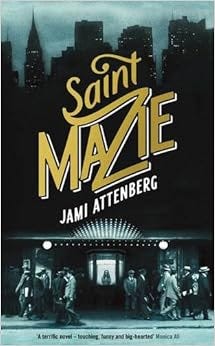Saint Mazie by Jami Attenberg

When I booked a ticket for the Ilkley Literature Festival event featuring Jami Attenberg and Liza Klaussmann, I hadn't heard of either author and my main interest was as a writer. I keep dabbling in historical fiction inspired by family history research, and both Attenberg's Saint Mazie and Klaussmann's Villa America were set in the first half of the twentieth century and featured real people (Mazie Philips in the one, a host of well-known artists, writers etc in the other) as characters. Since Saint Mazie was available in my local library (I plucked it from the midst of their literature festival display) I started reading it, and I fell for Mazie Philips in a big way.
Saint Mazie is of course billed as being about helping homeless men during the Depression, since that's what the real Mazie was known for, but actually the Wall Street Crash doesn't happen till page 242 (of 321). What the novel is really about is Mazie herself, her extraordinary life, what drove her, how she became the woman she was known as. I don't know how much of it is based in fact, or how much is really known about Mazie's background, but as a novel it was captivating. The poverty all around, the difficulties and tragedy of everyday life, and Mazie pushing through the lot, just keeping going and helping out, wisecracking and drinking her way through another day. She's what you'd call a strong female character and she becomes kind of a bedrock for other people to build their lives on. In a way she reminded me of George Bailey in It's a Wonderful Life, never getting to follow his own dreams or live his own life because he has to be there for other people.
The format of the novel is unusual and works well. Snippets of Mazie's (fictional) diary interweave with (fictional) interviews with an old friend of hers, descendants of those who knew her, local historians and other tangential connections who all have different takes or know different parts of her story. At first I found the rapidly switching points of view a little disorienting but it settled down into longer stints with Mazie's diary and by then I was hooked by the story anyway. I did find it easier to read once I'd started voicing it as Mary Beth from Cagney and Lacey in my head (it might not be quite the right accent, but it helped me with the rhythm of Mazie's speech patterns).
This is a novel full of love, loss, loyalty and humour. It has heartbreaking moments when I really wondered how Mazie could carry on, but she did. It's the story of the New York poor as much as it's about one individual, and I would recommend it widely. If, like me, you're fond of F Scott Fitzgerald, and Cary Grant films, and think of New York in the twenties as one long glamorous party full of socialites, reflect as you read this that it's largely happening in the same city at the same time.


